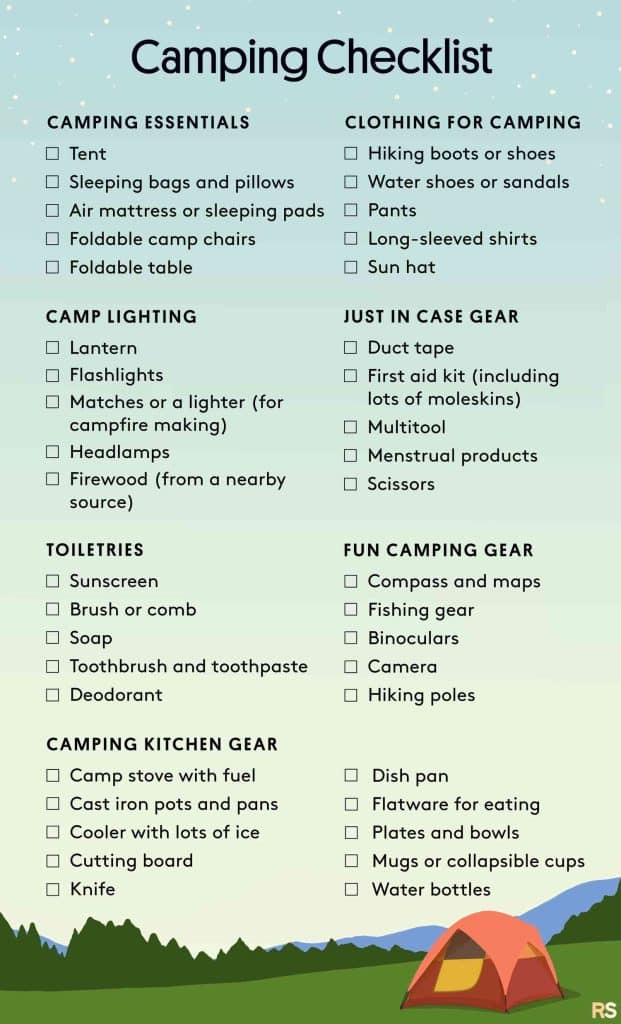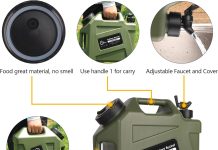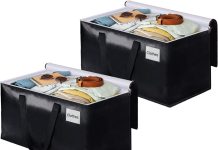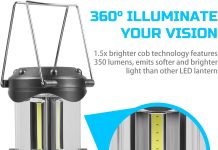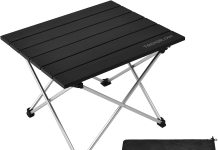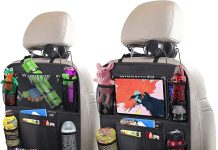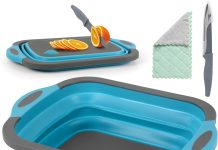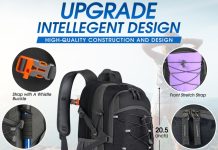When embarking on a thrilling outdoor adventure, having the right camping gear in tow is essential. From the rugged mountains to serene lakesides, the list of necessary equipment can seem overwhelming. However, fear not, as we are here to assist you in narrowing down the camping essentials that will make your trip a breeze. Whether you are a seasoned camping enthusiast or a beginner, this article is your ultimate guide to ensuring a comfortable, safe, and unforgettable camping experience.
This image is the property of www.realsimple.com.
Review contents
Shelter and Sleeping Gear
Tent
A good tent is essential for shelter during camping trips. It protects from the elements and is a comfortable place to sleep. When choosing a tent, consider its size, capacity, materials, and durability. Look for a tent that is easy to set up and take down, with sturdy poles and a rainfly for added protection.
Sleeping Bag
A high-quality sleeping bag ensures a good night’s sleep while camping. Look for one suitable for the expected temperature range during your trip. Sleeping bags are rated using temperature ratings, such as 20 degrees Fahrenheit or 0 degrees Celsius, which indicate the lowest temperature at which you will stay warm. Consider the materials, insulation type, and weight when selecting a sleeping bag.
Sleeping Pad
A sleeping pad provides insulation and cushioning between you and the ground. It helps to regulate body temperature and ensures a comfortable sleep surface. Various types of sleeping pads are available, including self-inflating, foam, and air mattresses. Choose one that suits your preferences and provides adequate insulation and support.
Pillow
While some campers may forego a pillow and use a rolled-up jacket or clothing instead, having a dedicated camping pillow can significantly enhance your comfort while sleeping. Look for a lightweight, compact pillow that offers sufficient support for your neck and head.
Cooking and Eating Equipment
Stove
A camping stove is essential for cooking meals and boiling water while camping. Various types of stoves are available, such as propane stoves, liquid fuel stoves, and canister stoves. Consider factors like fuel efficiency, ease of use, and stability when selecting a stove.
Cookware
Pack lightweight and durable cookware that suits your cooking needs. Look for a set that includes a pot, pan, and utensils. Non-stick coatings can make clean-up easier. Consider the size and capacity of the cookware to accommodate your camping meals.
Utensils
Bring essential utensils like spoons, forks, and knives for eating and cooking. Consider opting for utensils made from durable materials, such as stainless steel or titanium. Pack a spatula for flipping food and a can opener if needed.
Food Storage
Proper food storage is essential to prevent spoilage and attract wildlife. Use airtight containers or resealable bags to store dry foods like snacks and cereals. Insulated coolers are essential for storing perishable items. Consider bringing reusable food storage containers to minimize waste and tidy your campsite.
Water Bottle
Staying hydrated is essential while camping. Be sure to pack a durable and reusable water bottle. Opt for one with a wide-mouth opening for easy refilling and cleaning. Look for bottles made from BPA-free materials and consider insulation features to keep your water cool.
Clothing and Footwear
Layers
Layering your clothing is vital in regulating body temperature while camping. Pack various lightweight and moisture-wicking base layers, insulating mid-layers, and weather-resistant outer layers. This allows you to adjust your clothing based on the weather conditions and activity level.
Rain Gear
Be prepared for unexpected rain showers by packing a waterproof jacket or raincoat. Consider options that are breathable to prevent excessive sweating. A pair of waterproof pants or rain gaiters can also keep your lower body dry. Don’t forget to bring waterproof covers for your backpack and footwear.
Hiking Boots
Investing in comfortable and supportive hiking boots is essential for enjoying your camping adventures. Look for boots with good traction, ankle support, and waterproof features. Break them in before your trip to avoid blisters and discomfort.
Camp Shoes
A pair of lightweight and easy-to-slip-on camp shoes is ideal for relaxing around the campsite after hiking or exploring. Look for comfortable sandals or lightweight sneakers that are breathable and easy to clean.
Headwear
Protecting your head from the sun and elements is vital during camping trips. Pack a wide-brimmed hat or a baseball cap to shield your face from the sun’s rays. Consider bringing a beanie or hat to keep warm during colder nights.
Navigation and Safety
Map and Compass
Even with modern technology, bringing a map and compass as backup navigational tools is essential. Learn how to read a map and use a compass before your trip to navigate confidently. Familiarize yourself with the area’s landmarks and topography to enhance your navigation skills.
GPS
A GPS device can be a valuable tool for navigation while camping. It can help you track your route, waypoints, and distance covered. Bring extra batteries or a portable charger to power your GPS device during longer trips.
First Aid Kit
Accidents and injuries can happen while camping, so always carry a well-stocked first aid kit. Include essentials like bandages, antiseptic wipes, pain relievers, insect bite cream, and any necessary medications. Familiarize yourself with basic first-aid procedures before your trip.
Emergency Whistle
In an emergency or if you become lost, having an emergency whistle can help alert others to your location. It’s a lightweight and effective way to attract attention and get help.
Flashlight or Headlamp
A reliable light source is essential for navigating the dark and finding your way around the campsite. Pack a flashlight, headlamp, and spare batteries to ensure you can see clearly at night. LED options are energy-efficient and provide bright illumination.
This image is the property of s3.amazonaws.com.
Personal Hygiene and Health
Toothbrush and Toothpaste
Maintaining oral hygiene is still essential while camping. Pack a travel-sized toothbrush and toothpaste to keep your teeth and gums healthy. Opt for biodegradable toothpaste to minimize environmental impact.
Soap and Towel
Pack biodegradable soap for bathing and cleaning dishes. Consider bringing a microfiber towel that is compact, quick-drying, and lightweight. This will allow you to stay clean and fresh during your camping trip.
Sunscreen
Protect your skin from harmful UV rays by using sunscreen. Choose a broad-spectrum sunscreen with a high SPF (sun protection factor) and apply it generously before going outdoors. Reapply regularly, especially after swimming or sweating.
Insect Repellent
Be prepared for pesky mosquitoes and other insects by packing insect repellent. Look for a repellent that contains DEET or other effective ingredients. Consider also bringing mosquito nets or screens for your tent to ensure a good night’s sleep.
Medications
If you require any prescription medications, pack an ample supply. Additionally, consider bringing over-the-counter medications like pain relievers, antihistamines, and remedies for common ailments like indigestion or allergies.
Tools and Accessories
Knife or Multi-tool
A versatile knife or multi-tool is a valuable camping accessory. It can be used for various tasks like food preparation, cutting rope, or repairing gear. Choose a high-quality and durable option that suits your needs.
Firestarter
A reliable firestarter is essential for cooking, staying warm, and creating a cozy ambiance at the campsite. Pack waterproof matches, a lighter, or a fire starter kit to ensure you can start a fire when needed.
Rope or Paracord
Pack a length of rope or paracord for various camping tasks like securing tarps, hanging food, or setting up a clothesline. Choose a strong, lightweight option that is easy to handle and won’t take up too much space in your pack.
Duct Tape
Duct tape is the “handyman’s secret weapon” and is incredibly versatile. It can be used for repairs, securing gear, or even creating impromptu bandages. Wrap a small amount around a pencil or lighter to save space.
Backpack
A reliable backpack is essential for carrying all your gear while camping. Look for one with comfortable shoulder straps, adjustable waist belts, and sufficient storage capacity. Consider the type of camping you plan to do and choose a backpack that suits your needs.
This image is the property of slashedbeauty.com.
Lighting and Communication
Lantern or Campfire
Create a cozy and well-lit campsite by bringing a lantern or setting up a campfire. Choose a lantern that provides sufficient light without being too bulky. A campfire can provide warmth and a gathering place for storytelling and relaxing.
Portable Charger
You are keeping your devices charged while camping may be necessary in the digital age. Bring a portable charger with sufficient capacity to power your phone, GPS, or other devices. Look for lightweight and durable options.
Two-way Radios or Cellphone
Communication is vital during camping trips, especially in remote areas. Bring two-way radios or a fully charged cellphone for emergencies, or stay connected with your camping group. Remember that cell service may be limited to specific locations.
Whistle
In addition to the earlier emergency whistle, having a whistle on hand can help signal or alert others during group activities or emergencies. It’s a small and lightweight tool that can come in handy.
Signal Mirror
A signal mirror can be a lifesaver in emergencies. It can reflect sunlight and attract attention from search and rescue teams. Please keep it in your backpack or attach it to your clothing for easy access.
Entertainment and Comfort
Camp Chair or Hammock
Bring a lightweight and collapsible camp chair or hammock to enhance your camping comfort. It provides a comfortable place to relax, read a book, or enjoy the surrounding nature. Look for options that are durable and easy to set up.
Books or Games
Unplug and unwind by bringing your favorite books or games for entertainment during downtime. Choose lightweight options like paperbacks or travel-sized games that won’t add too much weight to your pack.
Portable Speaker
Consider bringing a portable speaker if you enjoy listening to music or podcasts while camping. Look for a rugged and waterproof option that provides good sound quality without draining too much battery power.
Camp Table
A portable camp table is a convenient addition to your campsite. It provides a stable surface for food preparation, dining, or playing games. Look for a lightweight and foldable table that can be easily transported.
Camp Pillow
A lightweight and compact camp pillow can make a significant difference for added comfort during sleep. Look for inflatable or compressible pillows, allowing you to adjust the firmness as desired.
This image is the property of www.primalsurvivor.net.
Miscellaneous
Trash Bags
Always pack enough trash bags to keep your campsite clean and minimize environmental impact. Separate recyclables from non-recyclable waste and follow proper waste disposal guidelines.
Repair Kit
A repair kit can help mend gear or equipment in case of damage. Include repair patches, duct tape, sewing kit, and replacement hardware. These can save the day if any equipment or clothing requires quick fixes.
Cash or Cards
While many campsites accept electronic payments, having some cash on hand for emergencies or unexpected situations is always good. Make sure to bring small bills and coins for convenience.
Camera or Binoculars
Capture memorable moments and enjoy the beauty of nature by bringing a camera or binoculars. Choose a durable and lightweight camera, or opt for a smartphone with a quality camera. Binoculars are ideal for bird watching or observing wildlife.
Bug Net or Tarp
Bring a bug net or tarp to protect yourself from pesky bugs and insects. A bug net can be used over your sleeping area, while a tarp provides additional shelter from rain or sun. Look for lightweight options that are easy to set up and pack.
Optional Gear
Fishing Gear
If you enjoy fishing, consider packing the necessary fishing gear for your camping trip. This may include fishing rods, hooks, lines, and bait. Check local fishing regulations and obtain the required licenses before casting your line.
Hiking Poles
Hiking poles can provide stability and reduce strain on your joints while trekking on uneven terrain. They can also help balance and distribute weight while carrying a backpack. Consider using collapsible poles for easy storage and transportation.
Camp Shower
A camp shower can provide a much-needed refreshing wash for extended camping trips or locations without shower facilities. Look for portable and easy-to-use options that allow you to maintain personal hygiene while enjoying the great outdoors.
Solar Charger
If you plan to rely on electronic devices during your camping trip, consider investing in a solar charger. It harnesses the power of the sun to charge your devices, providing a sustainable and convenient charging solution.
Portable Toilet
For those who prefer more comfortable bathroom facilities while camping, a portable toilet is worth considering. Portable toilets are self-contained and easy to set up, providing a more sanitary and convenient solution than traditional pit toilets or bushes.
Camping gear requirements vary based on personal preferences, style, and the specific trip. Assess your needs, considering factors like the expected weather conditions, duration of the trip, and the activities you plan to engage in. Pack wisely, and most importantly, enjoy your camping experience surrounded by nature’s beauty. Happy camping!
This image is the property of www.realsimple.com.






